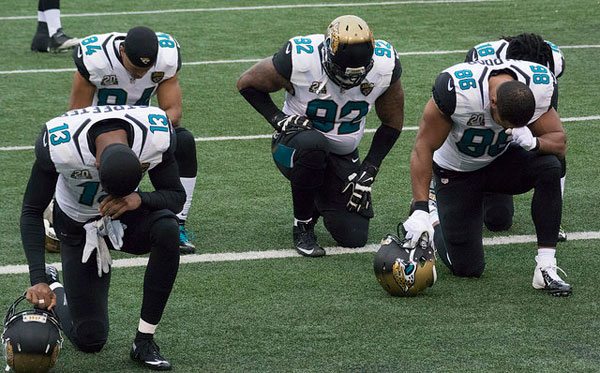
October 18, 2017; Washington Post
The framing of the debate around NFL players who kneel during the national anthem is nearly as confused and controversial as the act itself.
Instead of asking what players are protesting and how the problem can be solved—and, by the way, there is no mystery here, as players have made clear that the protests are a response to the “incredible number of unarmed black people being killed by the police,” as San Francisco 49er safety Eric Reid wrote in the New York Times—vitriol has flowed over whether the demonstration is a question of free speech or of patriotism and whether those things are related or mutually exclusive, if this is something the NFL can regulate, and whether the players’ high salaries factor into the question of permissibility. At the end of the day, many arguments gloss over the concern about black lives that started the whole thing.
Fortunately, within the NFL, the source of player concerns is widely understood. This week, the NFL owners met in New York, and, while it was rumored that the owners would decide whether to require players to stand for the national anthem or risk losing their jobs, these rumors were false. Indeed, there wasn’t even a vote.
A joint statement from the NFL and the NFL Players’ Association read:
Today owners and players had a productive meeting focused on how we can work together to promote positive social change and address inequality in our communities. NFL executives and owners joined NFLPA executives and player leaders to review and discuss plans to utilize our platform to promote equality and effectuate positive change. We agreed that these are common issues and pledged to meet again to continue this work together.
As we said last week, everyone who is part of our NFL community has a tremendous respect for our country, our flag, our anthem and our military. In the best American tradition, we are coming together to find common ground and commit to the hard work required for positive change.
Some expressed skepticism of the NFL’s motives. Dan Pfeiffer, a former Senior Advisor to President Barack Obama for Strategy and Communications, pointed out last week, “The owners don’t have as much leverage as they think…[Dallas Cowboys owner] Jerry Jones is not firing” his star players. The majority of NFL owners donated to President Trump, so it would be a stretch to cast them as Trump resisters, but it’s encouraging to see them take this public position supporting the players.
Sign up for our free newsletters
Subscribe to NPQ's newsletters to have our top stories delivered directly to your inbox.
By signing up, you agree to our privacy policy and terms of use, and to receive messages from NPQ and our partners.
NFL commissioner Roger Goodell told reporters, “We believe everyone should stand for the national anthem, it’s an important part of our game.” However, as Pfeiffer pointed out, “As commissioner of the NFL, a league with a majority of African American players…You can make a decision that you believe the national anthem represents [respect for soldiers] and so you should stand, but it is a bad public policy to say that you cannot express your opinion.”
The Congressional Black Caucus agreed, stating in a letter to the NFL:
Peacefully protesting is one of the most American things any citizen can do. In fact, it is a form of “speech” that is protected by the First Amendment to the Constitution…Failure by some to understand this basic civics lesson is a problem. But what is more problematic is their failure to realize that kneeling during the National Anthem is not the cause, but the effect, and that they are more outraged by it than they are about the shooting and killing of unarmed African Americans.
That “some” includes President Donald Trump, who responded to the NFL’s decision with a spiteful tweet, calling their decision “Total disrespect for our great country!” President Trump has previously called for players who kneel to be fired, and referred to them as “sons of bitches.”
President Trump seems somewhat shaky on the first amendment this week; he also pondered aloud whether media networks’ licenses should be revoked, causing Senator Ben Sasse (R-NE) to ask, “Are you tonight recanting of the oath you took on January 20th to preserve, protect, and defend the First Amendment?”
It’s worth noting that football has been subjected to federal political pressure before. For example, the US Department of Defense has paid the NFL and other sports leagues millions of dollars for “on-field color guard, enlistment and reenlistment ceremonies, performances of the national anthem, full-field flag details, ceremonial first pitches͕ and puck drops,” according to a 2016 report by Senators Jeff Flake and John McCain, Republicans from Arizona. Although it is “unclear whether NFL teams’ appearing on the field for the playing of the national anthem” began in conjunction with the payments from DOD, according to Snopes, the report went so far as to call the patriotic displays “little more than a taxpayer-funded boondoggle” aimed at increasing military recruitment.
Did the NFL weigh the loss of support from those who oppose kneeling against the difficulties of hosting games without star players who refused to capitulate? Or did they come to a moral decision about the values of free speech? The framing of that debate should not override the potential value of having such a large and powerful organization publicly take the side of Black Lives Matter. NPQ author Steve Dubb called sporting events “key sites where our collective identities are forged,” so the NFL’s decision carries a lot of weight. Whatever President Trump may think, their decision shows respect for true American values.—Erin Rubin












